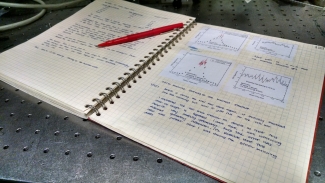The use of lab notebooks for scientific documentation is a ubiquitous part of physics research. These records, documented in physics labs all around the world, constitute the foundational information for essentially all the published experimental results found in physics journals. Without thoughtful and thorough records of experimental progress, it is difficult to imagine physicists successfully navigating the complexities of today's research frontier. Given its importance, the skill of scientific documentation and how it is developed deserves more active consideration than it has to date. We interviewed physics graduate students who are engaged in research in order to 1) better understand the educational experiences researchers have had in the development of their documentation skills and 2) establish recommendations for the incorporation of authentic documentation into lab courses.
How do Researchers Develop Their Documentation Practice?
In our interviews, most researchers described their experiences in undergraduate lab courses as generally not being beneficial to the development of their documentation skills. The most beneficial experiences were those in an authentic research environment. For many, this only occurred once they had started research in their graduate programs. Furthermore, most of the researchers described receiving minimal oversight or feedback regarding the state of their documentation either from course instructors or research advisors.
Recommendations for Authentic Documentation in Lab Courses
Undergraduate lab courses are some of the earliest opportunities for students to start engaging in the practice of scientific documentation. Providing explicit training in documentation during lab courses will help to better prepare these students to maintain lab notebooks in an academic or industry research setting. However, one impediment to the inclusion of explicit training, is that it may be unclear to instructors what constitutes ''best practices'' and how those best practices can be incorporated into the class environment.
From our interviews we have synthesized the aspects of documentation that were generally found to be universal among the researchers. There are a number of broad principles that researchers employ when performing documentation. For example, being considerate of the audience for their documentation, as well as the timescale on which the documentation is referenced. Students should be encouraged to implement these kinds of principles when using notebooks in their lab courses. On the other hand, the structure and format of the researchers' notebook entries were highly variable. Thus, it is likely not fruitful to teach a specific format or template for students' notebook entries.
Additionally, for lab courses to help develop documentation skills, the lab activities themselves must be designed in a way that necessitates the use of lab notebooks to make progress on the lab activities. The researchers described this as the most beneficial way that lab courses could promote the development of this important skill. In our work, we provide a number of ways to achieve this goal.



 The Physics Frontiers Centers (PFC) program supports university-based centers and institutes where the collective efforts of a larger group of individuals can enable transformational advances in the most promising research areas. The program is designed to foster major breakthroughs at the intellectual frontiers of physics by providing needed resources such as combinations of talents, skills, disciplines, and/or specialized infrastructure, not usually available to individual investigators or small groups, in an environment in which the collective efforts of the larger group can be shown to be seminal to promoting significant progress in the science and the education of students. PFCs also include creative, substantive activities aimed at enhancing education, broadening participation of traditionally underrepresented groups, and outreach to the scientific community and general public.
The Physics Frontiers Centers (PFC) program supports university-based centers and institutes where the collective efforts of a larger group of individuals can enable transformational advances in the most promising research areas. The program is designed to foster major breakthroughs at the intellectual frontiers of physics by providing needed resources such as combinations of talents, skills, disciplines, and/or specialized infrastructure, not usually available to individual investigators or small groups, in an environment in which the collective efforts of the larger group can be shown to be seminal to promoting significant progress in the science and the education of students. PFCs also include creative, substantive activities aimed at enhancing education, broadening participation of traditionally underrepresented groups, and outreach to the scientific community and general public.